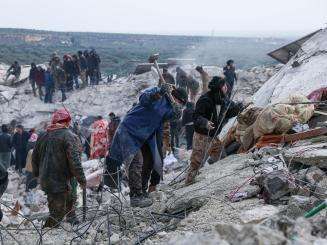Ricardo Martínez, logistics coordinator of the emergency unit at Doctors Without Borders/Médecins Sans Frontières (MSF), leads one of the first teams that the organization is sending from Spain to Turkey. The team will assess the situation and the humanitarian needs in some of the areas most affected by the earthquakes. “The sooner we get in touch with the local authorities, the sooner we will understand what their most acute needs are,” said Martínez. “We will coordinate with them, what is our added value in the intervention.”
Other MSF teams were already present in northern Syria, treating the injured and carrying out distributions of emergency medical kits and relief items since the first hours after the earthquakes.
February 06 07:43 AM
Earthquakes in Turkey and Syria: What is MSF doing?
MSF teams in northern Syria have been responding since the first hours of the disaster
Read More
Transcript:
This is Ricardo, I'm the logistics coordinator of the emergency unit at MSF. I'm about to leave for Turkey to respond to the earthquake that happened yesterday in Turkey and Syria.
If we want to have a good impact in the intervention, we need to have a full team. So, all the profiles are included, and we have been able to find all the colleagues that are needed in this intervention: administration, finance, medical, mental health, logistics, supply.
The sooner we get in touch with the local authorities, the sooner we will understand what their most acute needs are. Then we will know, we will see with them, we will coordinate with them, what is our added value in the intervention. The first 72 hours is search and rescue, it’s the most critical part of the intervention and in parallel the referral system because there are a lot of wounded, there are a lot of people that got injured and they need their urgent surgical intervention.
Urgent surgical intervention is just one component of MSF’s response. “We have to identify the chronic diseases that are also collateral damage in this kind of intervention,” said Ricardo Martínez, the logistics coordinator of the emergency unit at MSF. “Mental health is another pillar of our intervention because we know from experience that it's crucial to start these activities immediately.” Many people have also lost their homes and urgently need shelter during this harsh winter. MSF is preparing to help the sheltering effort with water, sanitation, and other hygiene needs.
So, it's going to take us longer than expected because the roads, the highways, have been damaged. It's going to be a challenge for us to get as close as possible to the epicenter of the intervention. And once we are there, we don't know, we don't know how long it's going to take us to be able to do a good assessment in order to understand the most critical needs for the intervention. Probably access is going to be the first challenge, then supply, supply is of importance. And we will need to identify as soon as possible the key places where we can get the supply in order to implement the intervention.
How you can help
Not everyone can treat patients in the field. But everyone can do something.
Some humanitarian crises make the headlines—others don’t. Unrestricted support from our donors allows us to mobilize quickly and efficiently to provide lifesaving medical care to the people who need it most, whether those needs are in the spotlight or not. And your donation is 100 percent tax-deductible.



